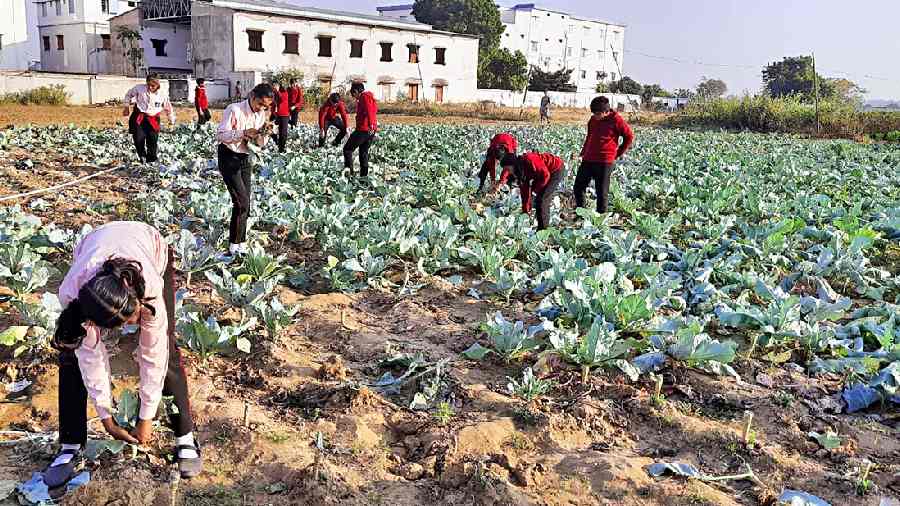Students of a small school in a village in Jhargram district of West Bengal carried home cauliflowers that they had assisted in growing this season on their school premises.
Children from classes V and VI, the senior-most classes in a private school that started just before the pandemic in a pocket of Bengal where education centres are sparse, have been planting vegetable plants, dirtying their hands with soil and watering the crops this winter.
The fruits of their toil are cauliflowers, tomatoes lemons and coriander leaves. Each student carried home two cauliflowers with them recently.
The spinach, cabbage and bell peppers have just been harvested.
The students at Ved Vyas Vidyapith in Daha Munda village in Gopiballabpur I gram panchayat, about 52km from Jhargram town, have been getting a hands-on training of what they learn in books on a 1.5-acre plot on the school premises.
The idea is to make the children who belong to the villages feel proud of their roots and the produce of the land, said a teacher associated with the project.
While most of the hard work is done by the farmers the students too get their hands dirty, note down how long does it takes a vegetable to grow and the conditions that are conducive for the growth.
“They are observing how a crop grows and then how a vegetable travels from the farm to the kitchen. These are things that they learn in books and unlike their urban counterparts these children have access to farms and ponds that can be made use of as aids in their learning process,” said Manjir Ghosh, a former principal who is the academic adviser to the school.
The children stay in the school from 8am to 4pm and the work on the field supplements the classroom teaching.
“From one project we can teach our children multiple values and they can carry those lessons back home,” said Ghosh.
Ghosh said that the children belong to well-to-do families, farmers who have land but in many of the families education is lacking, a gap that the school intends to bridge.
“What we grow here is primarily for the children,” said Bibhas Chandra Sau, the secretary of the school.
Sau said that the project is teaching children self-dependence, something that their roots can give them.
“It would teach them from the beginning that the farm can make them both self-sufficient and maybe even entrepreneurs if nurtured properly,” said Sau.
“The number of government jobs is always limited. So one has to develop alternative sources of earning,” he said.
Ghosh said that they are teaching them not to look down upon farming but to understand what is produced here on the farms feeds many in the cities.
“We try to explain to the students that what they have even the urban children do not have and they need to feel proud of it, utilise and value it,” said Ghosh.
